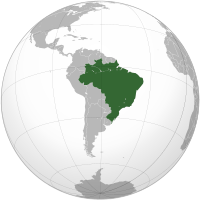LGBT rights in São Paulo (state)
LGBTQ rights in São Paulo | |
|---|---|
 | |
| Status | Legal since 1830,[1] age of consent equalised |
| Gender identity | Gender change allowed,[2] official standard for altering legal sex doesn't require surgery since 2018 |
| Military | Allowed to serve openly[3] |
| Discrimination protections | Since 2019 |
| Family rights | |
| Recognition of relationships | Same-sex marriage since 2013[4][5] |
| Adoption | Legal since 2010[6] |
Lesbian, gay, bisexual and transgender rights in the Brazilian state of São Paulo are liberal. Same-sex marriage is legally performed in the state, as in Brazil as a whole.
Laws against homosexuality
[edit]Homosexuality is legal in São Paulo State.
Hate crimes and discrimination law
[edit]
The São Paulo Law No. 10 948 went into effect on 5 November 2001, providing for penalties to be applied to the practice of discrimination on grounds of sexual orientation and other measures.[7][8][9]
LGBT adoption
[edit]In 2006, a male gay couple from Catanduva, São Paulo officially adopted a five-year-old girl.[10]
Same-sex marriage
[edit]On December 18, 2012, the Justice Court of São Paulo state ordered all notaries statewide to open marriages licenses for same-sex couples, becoming the most populous Brazilian state to offer same-sex marriages in a manner that is equal to other marriages.[11]
LGBT life
[edit]Cultural expression
[edit]According to the Guinness World Records, the São Paulo Gay Pride Parade is the world's largest LGBT Pride celebration, with 4 million people in 2009.[12] In 2007, in its eleventh edition, the São Paulo Gay Pride Parade broke its own record as the biggest parade in the world and attracted 3.5 million people.[13]
Rights advocacy
[edit]SOMOS, an LGBT rights organization, was established in 1980 in São Paulo, at the same time as Gay Group of Bahia was established in Bahia.
Homophobia
[edit]In 2005, the Latin American Center of Human Rights in Sexuality (Clam) interviewed participants in the São Paulo Gay Pride Parade and found that 65% of their respondents had experienced hate speech and/or suffered physical aggression.[citation needed]
The Richarlyson affair occurred in which a judge was brought before the Justice Council of São Paulo for stating in court that soccer is a "virile, masculine sport and not a homosexual one." However, afterwards the same judge apologized and afterwards decided to annul the decision he wrote.[14]
References
[edit]- ^ 16 December 1830 Law (in Portuguese)
- ^ Changing legal gender assignment in Brazil (in Portuguese)
- ^ Gays and Lesbians allowed to serve openly in the Brazilian Military Archived October 5, 2011, at the Wayback Machine (in Portuguese)
- ^ "Portal CNJ - CNJ determina que cartórios terão de reconhecer união de pessoas do mesmo sexo". Archived from the original on June 15, 2013. Retrieved May 14, 2013.
- ^ "Brazilian judicial council orders notaries to recognize same-sex marriage". CNN. May 15, 2013.
- ^ Adoption of same-sex unions in Brazil (in Portuguese)
- ^ Leis antidiscriminatórias no Brasil (Anti-homophobia laws in Brazil) Archived 2015-07-15 at the Wayback Machine (in Portuguese)
- ^ Laws – Sexual Orientation (in Portuguese) Archived 2012-03-05 at the Wayback Machine
- ^ Laws – Sexual orientation by Location (in Portuguese) Archived 2012-03-05 at the Wayback Machine
- ^ Cartórios de SP aceitam registro de união gay". Baptista, Renata. Folha de S. Paulo. November 23, 2006. (in Portuguese)
- ^ Casamento gay em São Paulo/Same-sex marriage in São Paulo state (in Portuguese)
- ^ São Paulo Gay Parade (in English)
- ^ São Paulo Gay Pride Parade. Folha de S. Paulo. June 10, 2007. (in Portuguese)
- ^ Em programa de TV, Richarlyson nega ser homossexual (in Portuguese)

